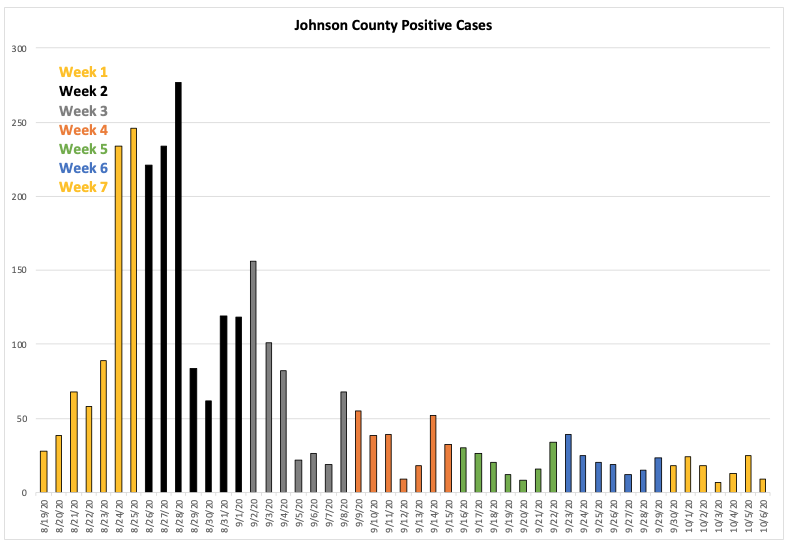Campus operations update
The University of Iowa continues to work with local and state officials to support and implement policies to slow the spread of the COVID-19 virus. What has occurred since the initial spike in late August is a reduction and now a plateau of positive cases, according to information from Johnson County Public Health.

While we must remain vigilant, as a community, we have considerably slowed the spread of the disease. If the positive case rates spike and stay high, we will consider additional actions, in coordination with Johnson County Public Health, the Iowa Department of Public Health, and the Board of Regents, State of Iowa.
University of Iowa self-reported COVID-19 testing
These data reflect new cases since Oct. 5, 2020.
The University of Iowa has published an updated snapshot of self-reported positive COVID-19 tests from faculty, staff, and students.
Number of self-reported cases of COVID-19
Students
- New cases: 17
- Semester-to-date: 2,028
Employees
- New cases: 6
- Semester-to-date: 54
These numbers reflect only self-reported positive or presumed positive COVID-19 tests from UI faculty, staff, and students on the academic campus since Aug. 18, 2020. These data will not match data reported by UI Hospitals & Clinics or by the Iowa Department of Public Health for several reasons, including different testing time intervals and geographic scope. Students who also are employees of the university are only reported in the student number to avoid double counting. The UI has more than 30,000 students and nearly 30,000 employees. Many employees continue to work remotely but have self-reported to authorize sick leave.
Number of residence hall students in quarantine: 3*
Number of residence hall students in self-isolation: 8**
*Quarantine: Quarantine is used to keep someone who might have been exposed to COVID-19 away from others.
**Self-isolation: Isolation is used to separate people infected with the virus (those who are symptomatic and those with no symptoms) from people who are not infected.
Mental health resources: Building resilience
Our emotional well-being comes from our sense of purpose, community, social connections, financial security, and physical health, all of which might be affected due to COVID-19. Resilience is something that can help us move through challenging times. The American Psychological Association has identified evidence-based ways to navigate challenging times including:
- Make connections
- Avoid seeing crises as insurmountable problems
- Accept that change is a part of living
- Move towards your goals
- Take decisive actions
- Seek opportunities for self-discovery
- Nurture a positive view of yourself
- Keep things in perspective
- Maintain a hopeful outlook
- Take care of yourself
For more tips on how to build resilience, check out the University of Iowa’s liveWELL, Employee Assistance Program, and Family Service units’ video library.